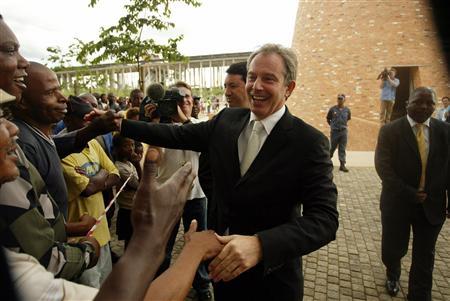|
UK's Blair faces big test over terrorism bill
(AP)
Updated: 2006-02-15 10:32
British Prime Minister Tony Blair faces a tough test of his authority on
Wednesday when parliament votes on a bill to toughen laws to fight terrorism.
Analysts say if rebel lawmakers help block the bill it would undermine
Blair's authority within in his Labour party and could hasten calls for him to
step aside and let would-be successor Finance Minister Gordon Brown take over.
The Terrorism Bill was drafted after four militant Islamist suicide bombers
killed 52 commuters on the London transport system last July and aims to make it
easier to prosecute groups or individuals encouraging terrorism.
|

British Prime
Minister Tony Blair greets wellwishers in Soweto township outside
Johannesburg February 13, 2006. Blair, who is in South Africa for the
Progressive Governance Summit, visited Kliptown in the township where the
country's Freedom Charter was drafted in 1958.
[Reuters]
|
However, it has suffered setbacks already.
In November, Blair endured his first defeat in parliament since coming to
power in 1997 when lawmakers threw out plans to detain suspects for up to 90
days without charge. A compromise of 28 days was agreed.
The main bone of contention this time round is a clause to make the
glorification of terrorism a criminal offence.
It scrapped through the lower house by 305 votes to 289 last year but all
references to glorification were struck from the bill by the upper house, or
House of Lords.
Critics say the measures are too loosely worded. Rebel Labour lawmakers fear
T-shirts with inflammatory slogans could become illegal and academics are
concerned they could be prosecuted for talking about terrorist groups with
students.
They also argue that the conviction of British Muslim preacher Abu Hamza
al-Masri this month for inciting murder in his sermons shows existing laws
suffice.
The government plans to reintroduce references to the glorification of
terrorism and Blair has urged lawmakers to back the bill, saying the new law is
vital for security.
Blair argues that while free speech is an ancient right,
the right to life must come first and the government must do everything thing it
can to stop future attacks in Britain.
"What we are trying to achieve is a very clear signal to the courts ... that
we do everything we can to counter terrorism," Blair's official spokesman said
on Tuesday.
He said the government was also worried that the criteria for prosecuting
those deemed to be indirectly encouraging terrorism, or for proscribing militant
groups, had been watered down by the upper house.
"There are real substantial concerns that we have that we need to address
tomorrow," he said.
|